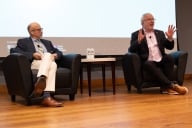You have /5 articles left.
Sign up for a free account or log in.
As librarians and lawyers continue to pore over the 350 pages of a long-awaited federal court decision involving copyright claims levied against Georgia State University’s library by academic publishers, one thing everybody seems to agree on is that, all things considered, the university “won.”
But what victory looks like at this stage remains to be seen and may not become clear for some time, experts say.
What is clear is that the three publishers -- Cambridge University Press, Oxford University Press, and Sage Publications -- who in 2008 sued Georgia State on behalf of the Association of American Publishers (AAP) and the Copyright Clearance Center will ask the court to direct Georgia State to tweak its e-reserve policy in a way that addresses some of the few scenarios in which Judge Orinda D. Evans said the university had overstepped its privileges under the educational “fair use” exemptions to U.S. copyright law.
The publishers have until May 30 to file for such an injunction. In a statement, the AAP said it intends to do so. The association did not say whether it plans to appeal the decision, only that it is “disappointed with aspects of the court’s ruling” and that the AAP is “studying” it. The association postponed a press call scheduled for Monday with R. Bruce Rich, the lead lawyer for the plaintiffs, citing a family emergency.
Update, 5/15: In a conference call with reporters, Rich, along with Tom Allen, the president of AAP, disputed the popular notion that the publishers had "lost" the lawsuit. Before the publishers brought the suit four years ago, Georgia State's standards for e-reserve copying were far more permissive. Only afterward, in anticipation of a court trial, did Georgia State tighten its e-reserves policies, Rich said. During the trial, Judge Evans said she would only consider the fair use merits of instances of alleged infringement that occurred during a specific period after Georgia State had overhauled its practices.
Therefore, the judge's ruling was based on legal parsing of examples "that nobody thought would be the focal point of this lawsuit when it was brought,” Rich said. “So for Georgia State to declare victory as to those kinds of works is a false trail.”
While the scorecard might not have favored the publishers, the lawsuit forced Georgia State to shore up its e-reserve practices and confirmed that publishers' copyright protections do indeed apply to e-reserves. And that, Rich said, is not small victory. The lawsuit "was never about drawing the line at this point or that point, but to address a system that basically snubbed its nose at copyright," he said. “At a very fundamental level, that issue has been affirmatively addressed."
The publishers have not yet decided whether to appeal the federal court's decision, Rich said. But the publisher's attorney said there are "a number of legal underpinnings" of the ruling that could be candidates for disputation, particularly Judge Evans's opinion that two factors of the litmus test for the applicability of fair use -- the "purpose or character" of the use and the "nature" of the copyrighted work -- will always favor university libraries in the context of e-reserves.
As far as Georgia State, which will have the opportunity to argue against an injunction before it would go into effect, the university does not plan to otherwise change its policy on electronic reserves, said Nancy Seamans, its director of libraries. Professors will have to be educated and vigilant when it comes to making decisions about what to put on e-reserve, but the university does not plan to take that prerogative out of their hands, she said.
“It doesn’t change a whole lot for us,” Seamans said, “but does provide some structure that hasn’t been in place previously.”
One certain outcome of the Georgia State case should be clearer guidelines for faculty members and librarians as they try to walk the line on fair use, said Jonathan Band, a Washington-based lawyer and fair use advocate who works frequently with librarians.
Although the judge’s ruling applies only to Georgia State, academic librarians long have believed the four-year-old lawsuit, and its outcome, would set the de facto standards for fair use and copyright infringement in the context of e-reserves -- a popular method by which libraries make relevant snippets of scholarly works available to students without compounding their bookstore expenditures. While the Association of Research Libraries did publish a “best practices” guide with regard to fair use in February, Friday’s ruling represents the first time a neutral authority has weighed in.
“I think there are institutions out that were thinking about having e-reserves but were holding back, or really limiting it because they were afraid,” Band said. “And I think this will give them more comfort that if they do this they have a safe harbor. And if they want a little more, they will have a reference point from which to assess risk.”
For example, the publishers had previously asserted that a 1976 agreement between publishers and some educational groups, which said only essays shorter than 2,500 words and poems under 250 words qualified for any fair use exemptions, applies to e-reserves at Georgia State. Judge Evans determined it does not. Instead, the judge said that professors who make less than 10 percent or one chapter of a book freely available to students are standing on firm legal ground.
“This [decision] provides so much specific guidance about quantities of material that I expect it will be used as a sort of default setting” as other academic libraries set about writing their own e-reserve policies, said James Grimmelmann, an associate professor at New York Law School.
At the same time, the specific examples that Judge Evans examined in her ruling hardly covered the full spectrum that the publishers had identified in their dossier of potential violations. “Over a third of the claims didn’t even make it to the fair use stage at the heart of the case,” Grimmelmann pointed out on his blog. “In many cases, the publishers were unable to prove to the court’s satisfaction that they owned the copyright in the portions of the books that were copied and uploaded.”
According to the Oxford press, the disqualification of these examples narrowed the sample in a way that made what seems like a lopsided victory for Georgia State -- vindication in 95 percent of the claims -- a misleading statistic. “The number of infringing works would have tripled under the judge’s standard if they hadn’t been thrown out based on the judge’s determinations regarding supporting contractual paperwork -- which would cast this decision in rather a different light,” said Niko Pfund, president of the Oxford press, in an e-mail.
“This ruling will certainly be an incentive to be sure our records are in order,” he said.
There are other uncertainties as well. One crucial factor in determining the pertinence of fair use -- the impact of free access to students in a course on "the market" for a copyrighted work -- depends on whether the copyright holder has provided a “reasonably available option” for a library to purchase a digital license for the excerpt on behalf of the students. As the infrastructure for selective digital licensing improves, publishers could find themselves in a stronger position to argue that libraries should pay for certain excerpts if they want to make those pages available to students.
Even for the most clearly drawn guidelines implicit in Judge Evans’s decision, there is the potential for jockeying between publishers and professors that makes the long-term effects of those guidelines on both parties uncertain. Professors who might normally have put two chapters of a book on e-reserve might elect to excerpt only one chapter so as to avoid paying a fee to publishers, Band said.
On the flip side, publishers could make their book chapters shorter, or decline to aggregate various works into single anthologies so that professors would be unable to purchase a full essay under the “one chapter” standard, said Grimmelmann.
These scenarios amount to pure speculation at this point, but the dance between publishers and libraries as Judge Evans’s framework settles will certainly bear on how Friday’s ruling affects the dynamics of e-reserve policy and practice over time, he said.
“I think the big unknown is what will happen on appeal, and whether this will be used as persuasive precedent by other courts in other cases,” Grimmelmann added.
For the latest technology news and opinion from Inside Higher Ed, follow @IHEtech on Twitter.








